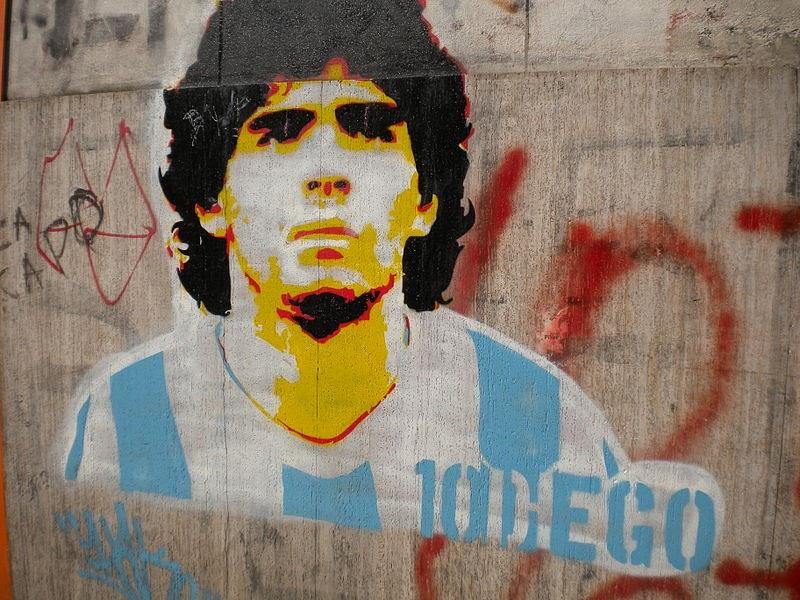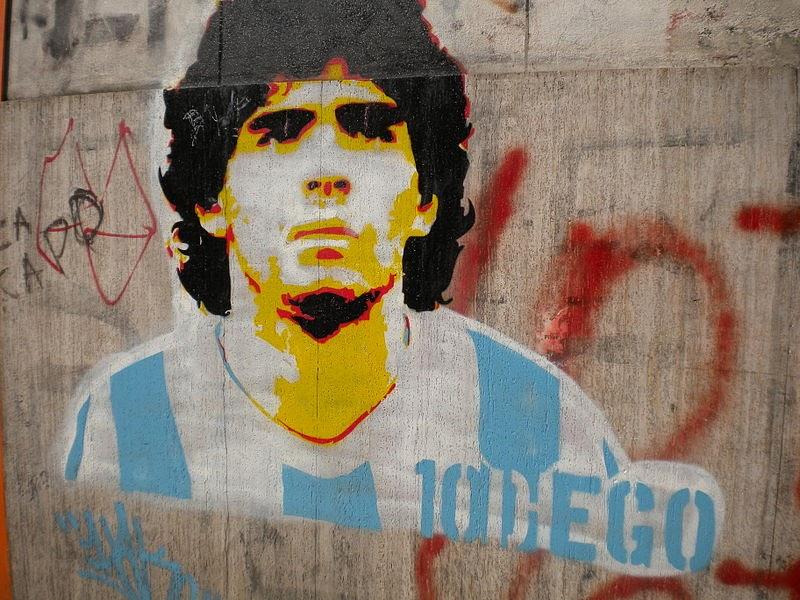
CAREER
You were born in Lanus, Buenos Aires, on October 30, 1960. Villa Fiorito was your home; living crowded and in squalor, your early life did nothing to diminish your love
When you turned three, you were gifted a football, and after that moment, were inseparable.
The man with strong legs, a balance that could never be toppled; your small stature, acceleration, lightning feet, and nimbleness separated you from a crowd. When you were young, people would say that your play was well beyond your years, your control and dribbling skills were unmatched. The ball was an extension of your foot, another limb that had grown out of your love for the sport.
You started with Los Cebollitas, where the town started to see a glimpse of the player you would become.
10 days before your 16th birthday, you became the youngest player in the history of the Argentine Primera Division, donning the 16 jersey as you walked onto the field.
That day, you performed the legendary nutmeg that thrust you into the world’s eyes, slyly sliding the ball through defender Juan Cabrera’s legs with terrifying ease. “That day I felt I had held the sky in my hands,” you said, feeling the exhilaration, the passion of the crowd, the muffled beats of your boots on the pitch, the glory.
From 1976 to 1981, with the Argentinos Junior, you scored 115 goals in 167 matches in your number ten position.
In 1983, you transferred to Barcelona, winning Spain’s annual national tournament, the Copa del Rey for your team, and beating out your rival, Real Madrid. In June, you scored an incredible goal, dribbling the ball past the Real goalkeeper, before tapping the ball into an empty net, an embodiment of your style. You were the first man then to receive a standing ovation from Real Madrid fans at Santiago Bernabeu, an event that didn’t occur a second time until 22 years later with Ronaldinho. The fans knew they were experiencing a remarkable moment in futbol history.
In Bilbao, we watched you dance with the ball, with passion, with fury, with merciless accuracy. We watched as you punched, kicked and clawed your opponents, anger boiling through your veins.
And despite your mistakes, you were welcomed with open arms to Napoli, reaching the peak of your career. You soon inherited the captain’s armband from teammate and veteran defender Giuseppe Bruscolotti, and redefined the team. “Ma-Gi-Ca,” the attacking lions that were you, Bruno Giordano, and Careca on the front line, sliced through all of Italy’s defense, winning Napoli’s first ever Serie A Italian Championship in 1986-87.
You turned their world upside down. You changed the city’s soul. Murals, dancing in the street, newborn babies as tribute, you were their god. They held funerals for other Italian teams, Juventus and Milan, burning coffins and putting out mock death notices. Napoli won its second league title in 1990 and finished runners up twice in 1987-88 and 1988-89. You played in Italy during a time of deep division within the country. Tensions were peaking due to the economic differences between the northern and southern parts of the country.
With Napoli, you won the Coppa Italia in 1987 (as well as a second-place finish in the Coppa Italia in 1989), the UEFA Cup in 1989, and the Italian Supercup in 1990. You were the top scorer in Serie A in 1987–88 with 15 goals, and were the all-time leading goalscorer for Napoli, with 115 total goals. In 2000, the number 10 jersey of Napoli was officially retired as homage to your incredible career. On 4 December 2020, nine days after your death, Napoli’s home stadium was renamed Stadio Diego Armando Maradona.
ADDICTION
Golden Boy, Pibe de Oro, deeply conflicted, running on cocaine and pure passion. You struggled deeply with addiction throughout your life; you started using cocaine in the mid 80’s, while playing with Barcelona. It only got worse once you moved to Napoli, said to be due to your connections with the Italian mafia. You got away with it until you didn’t. Banned for 15 months by Napoli for testing positive for cocaine, you were away from April 1991 to June 1992. Later that year, you were arrested in Buenos Aires for possession and given a 14 month suspended sentence.
Rejoining the Argentina team, you flexed your skill with an impressive goal against Greece in the group stage. Before the tournament ended, you were expelled for testing positive for five variants of ephedrine, which was a banned substance. You were banned by your own country’s futbol association, and FIFA followed, banning you for 15 months and ending your international career. You told Channel 13 after the decision: “They have retired me from soccer. I don’t think I want another revenge, my soul is broken.”
In 1997, playing with local clubs in Argentina, you failed a drug test for the third time in six years. This ultimately put your time playing professionally to an end. Your fame and glory were always followed by your drug use. It was something that shadowed you throughout your entire career.
In 2014, you told Argentina’s Tyc Sports: “I gave my opponents a big advantage due to my illness. Do you know the player I could have been if I hadn’t taken drugs? I am 53 going on 78 because my life hasn’t been normal. I’ve lived 80 [years] with the life I’ve gone through.” You overdosed in 2000, and had a heart attack in 2004. You were forced to have gastric bypass surgery in 2005 and in 2007 suffered from hepatitis.
ARGENTINA NATIONAL TEAM
91 international appearances and 34 goals with Argentina, you made your debut against Hungary February 27, 1977. With the team, you got four World Cups under your belt: 1982, 1986, 1990,1994.
At age 18, you played the 1979 FIFA World Youth Championship in Japan and emerged as the star of the tournament. You were a star, shining in Argentina’s 3–1 final win over the Soviet Union, scoring a total of six goals in six appearances in the tournament.
1986 was the year you captained Argentina in the World Cup. You beat West Germany in the final, winning the golden ball as the tournament’s best player. In the Quarterfinals, you scored both goals against England (2-1), including the Hand of God goal, disputed by some and what people called the goal of the century. You dribbled 66 yards past five English players to score a game winning goal.
In November of 2008, you became Argentina’s national team coach. From student to teacher, you knew it was your time to share your knowledge, to raise the new generation of futbol players.
“Maradona was a technical leader: a guy who resolved all difficulties that may come up on the pitch. Firstly, he was in charge of making the miracles happen, that’s something that gives team-mates a lot of confidence. Secondly, the scope of his celebrity was such that he absorbed all the pressures on behalf of his team-mates,” said Jorge Valdano, an Argentina national team teammate. “What I mean is: one slept soundly the night before a game not just because you knew you were playing next to Diego and Diego did things no other player in the world could do, but also because unconsciously we knew that if it was the case that we lost then Maradona would shoulder more of the burden, would be blamed more, than the rest of us. That was the kind of influence he exercised on the team.”
Gabriel Batistuta, also an Argentine national player, stated, “Diego could command a stadium, have everyone watch him. I played with him, and I can tell you how technically decisive he was for the team.”
Even England striker Gary Lineker conceded (referring to the 1986 Quarterfinal), “When Diego scored that second goal against us, I felt like applauding. I’d never felt like that before, but it’s true… and not just because it was such an important game. It was impossible to score such a beautiful goal. He’s the greatest player of all time, by a long way. A genuine phenomenon.”
Cross, Rabona, free kick, penalty kicks, all weapons in your arsenal. They called you the Artful Dodger, the urchin pickpocket from Charles Dickens’ Oliver Twist. Opponents and teammates alike were awed by your skill, dedication and passion for the game.
Your former manager Menotti noted,”I’m always cautious about using the word ‘genius’. I find it hard to apply that even to Mozart. The beauty of Diego’s game has a hereditary element – his natural ease with the ball – but it also owes a lot to his ability to learn: a lot of those brushstrokes, those strokes of ‘genius’, are in fact a product of his hard work. Diego worked very hard to be the best.”


































